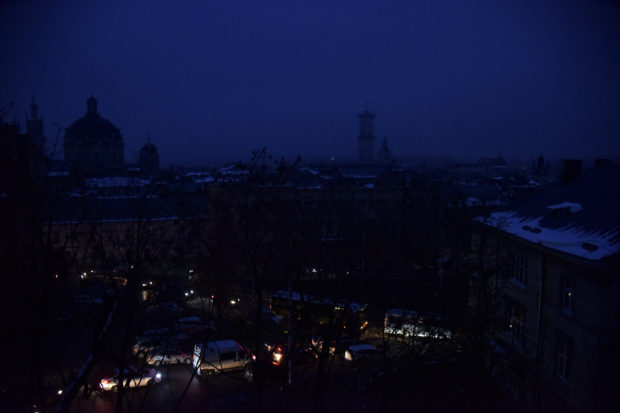
A view shows the city centre without electricity after critical civil infrastructure was hit by Russian missile attacks, amid Russia’s invasion of Ukraine, in Lviv, Ukraine November 23, 2022. REUTERS
WASHINGTON/KYIV — Ukrainian President Volodymyr Zelensky urged the United Nations Security Council to act against Russia over air strikes on civilian infrastructure that again plunged Ukrainian cities into darkness and cold as winter sets in.
Russia unleashed a missile barrage across Ukraine on Wednesday, killing 10 people, forcing shutdowns of nuclear power plants and cutting water and electricity supply in many places.
“Today is just one day, but we have received 70 missiles. That’s the Russian formula of terror. This is all against our energy infrastructure… Hospitals, schools, transport, residential districts all suffered,” Zelensky said via video link to the council chamber.
Ukraine was waiting to see “a very firm reaction” to Wednesday’s air strikes from the world, he added.
The council is unlikely to take any action in response to the appeal since Russia is a member with veto power.
U.S. Ambassador to the U.N. Linda Thomas-Greenfield said Russian President Vladimir Putin was “clearly weaponizing winter to inflict immense suffering on the Ukrainian people.”
The Russian president “will try to freeze the country into submission,” she added.
Russia’s U.N. ambassador Vasily Nebenzya responded by complaining that it was against council rules for Zelensky to appear via video, and rejected what he called “reckless threats and ultimatums” by Ukraine and its supporters in the West.
Nebenzya said damage to Ukraine’s infrastructure was caused by missiles fired by Ukrainian air defense systems that crashed into civilian areas after being fired at Russia’s missiles, and called on the West to stop providing Kyiv with air defense missiles.
The capital city of Kyiv was one of the main targets on Wednesday of the missile strikes. “Today we had three hits on high-rise apartment buildings. Unfortunately 10 people died,” said Interior Minister Denys Monastyrsky. Reuters was unable to independently verify the report.
Explosions reverberated throughout Kyiv as Russian missiles bore down and Ukrainian air defense rockets were fired in efforts to intercept them. Air raid sirens also blared across the country in a nationwide alert.
“Our little one was sleeping. Two years old. She was sleeping, she got covered. She is alive, thanks be to God,” said a man who gave his name as Fyodr, walking away from a smoldering apartment building that was hit in Kyiv, dragging a suitcase.
All of the Kyiv region, where over 3 million people live, lost electricity and running water, Kyiv’s governor said. Much of Ukraine suffered similar problems and some regions implemented emergency blackouts to help conserve energy and carry out repairs.
Early on Thursday, Zelensky said power and other services were being reconnected in more areas. “Energy specialists, municipal workers, emergency crews are working around the clock,” he said in a video address.
In the Lviv region in the country’s west, 90% of electricity was restored while in Odesa on the Crimean Peninsula, water and heat were fully reinstated, though only 10% of people had power again, Zelenskiy said.
Other regions were in varying stages of recovery. Only about 20% of electricity users in the Kyiv region were back online. “In Kyiv, the situation is very difficult,” the president said. “We expect a result…before lunch.”
Since October, Russia has acknowledged targeting Ukraine’s civilian energy grid far from front lines as a Ukrainian counter-offensive has recaptured territory from Russian occupiers in the east and south.
Moscow says the aim of its missile strikes is to weaken Ukraine’s ability to fight and push it to negotiate. Kyiv says the attacks on infrastructure amount to war crimes, deliberately intended to harm civilians and to break the national will.
That will not happen, Zelensky vowed in an earlier video address posted on the Telegram messaging app.
“We’ll renew everything and get through all of this because we are an unbreakable people,” he said.
First snow
With the first snow of Ukraine’s generally frigid winter falling, authorities worry about the impact of power cuts on millions of people.
Zelensky on Tuesday announced special “invincibility centers” would provide citizens with electricity, heat, water, internet, mobile phone links and a pharmacy, free of charge and around the clock. Kyrylo Tymoshenko, deputy head of the presidential administration, said on the Telegram messaging app that 2,750 of the centers were in operation on Wednesday night.
In addition, Europe’s biggest cities will donate power generators and transformers.
A series of Russian battlefield setbacks in the east and south included a retreat earlier this month from the key southern city of Kherson.
Ground battles continue to rage in the east, where Russia is pressing an offensive along a stretch of front line west of the city of Donetsk, which has been held by its proxies since 2014.
Moscow says it is carrying out a “special military operation” to protect Russian speakers in what Putin calls an artificial state carved from Russia. Ukraine and the West call the invasion an unprovoked land grab.
Western responses have included billions of dollars worth of financial aid and state-of-the-art military hardware for Kyiv and waves of punitive sanctions on Russia.
RELATED STORIES
Ukrainians likely to live with blackouts until March-end, says energy provider
Defiance by candlelight as Kyiv adapts to blackouts